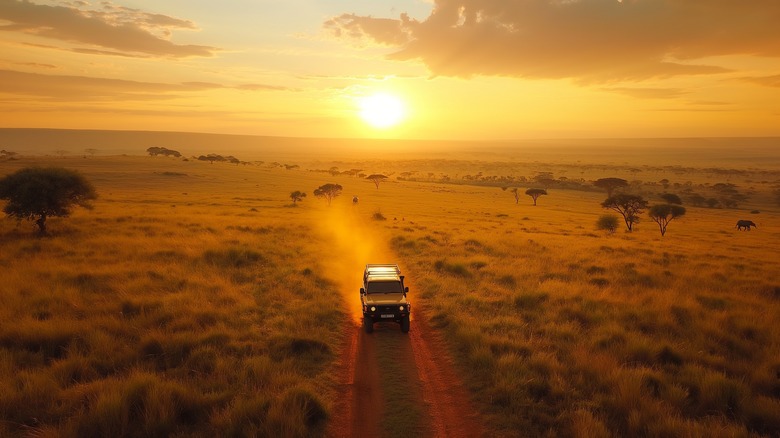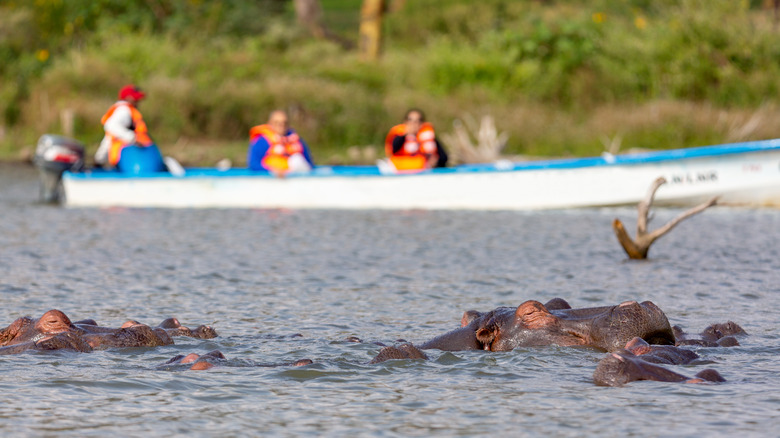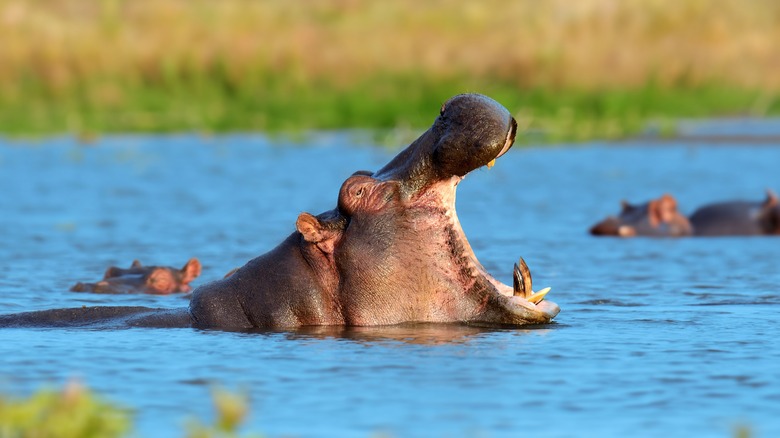Tourists Have A Terrifying Warning About This Popular Safari Attraction In Kenya
Without a doubt, sub-Saharan Africa is one of the world's best destinations for wildlife viewing. But wild animals can be extremely unpredictable, and this means that every safari experience entails some degree of risk. Surprisingly, one of the most dangerous animals you can encounter on safari is an "adorable" hippopotamus, which looks nowhere near as fierce as a lion but is actually seriously aggressive. Across Africa, hippos kill about 500 people every year.
Lake Naivasha, a popular safari destination about two hours from Nairobi, Kenya, is no stranger to hippo attacks. In 2018, two tourists photographing hippos were mauled, and one person later died of their injuries. Local fishers have also had deadly run-ins when getting too close, making it clear they're not to be underestimated.
According to Lake Naivasha visitors on Tripadvisor, some tour operators still have risky practices despite the attacks. "[W]e came to another group of five hippos basking in the sun onshore and we were getting closer and closer," one guest wrote in a review they titled "Not a safe way to view hippos." Another reviewer expressed concern over the boat, saying, "We did not feel safe being in a low, small craft so close to these animals." Reports of hippo attacks that keep trickling in from all over Africa serve as a terrifying warning for safari visitors to exercise extreme caution when in the vicinity of these seemingly harmless animals.
Why hippos are so dangerous
Hippo attacks tend to make the news, as a whopping 86% of them are fatal. In 2018, a hippo overturned the canoe of an American couple vacationing in Zimbabwe, launching them into the water. The hippo chomped down on the woman's femur, but she managed to survive, later recounting her tale on Animal Planet. Fast forward to 2024, when another American tourist was killed by a hippo while on a walking safari in Lower Zambezi National Park in Zambia. Just yikes.
There are a few different reasons they are among the most dangerous animals in the world. For one, the animals are extremely aggressive when provoked. Two, they're huge and unbelievably heavy, with males weighing in at over 7,000 pounds. Hippos also wield some pretty formidable weapons: their saber-like, 20-inch-long teeth and enormous jaws, which can open 180 degrees and snap shut with a force of 1,800 pounds per square inch. That's a biting force more powerful than that of a bull shark, polar bear, gorilla, and many other fearsome predators.
But hippos don't want to eat you for breakfast, as they're mainly herbivorous animals that subsist on grasses and aquatic plants. Rather, hippos' aggressiveness is linked to their highly territorial nature, which can become more pronounced during the dry season, when food and water supplies dwindle. Hippos may also attack humans or other animals (even lions and crocodiles) that they perceive as blocking their access to the water or threatening their young offspring.
How to stay safe around hippos while on safari
To avoid deadly confrontations with hippos, plan your safari carefully. When researching to determine which safari is right for you, pay attention to a company's safety policies and track record. Who are their safari guides? How were these individuals trained and how many years of experience do they have? These are questions that any reputable safari company should be able to answer when you inquire.
During a safari, listen to your safari guide's instructions at all times. If you are in a canoe, grant partially submerged hippos a very wide berth and occasionally tap the side of the boat to inform any completely submerged animals of your presence. In a safari vehicle, hippos won't normally pose a threat, and your guide should know when it's ok to exit the vehicle to photograph hippos and other animals from a safe distance. When exploring a safari park on foot, avoid getting between hippos and the water, and steer clear of thickets (where hippos may be lurking). Listen for oxpecker calls, which may signal that a hippo is nearby. In the worst case scenario, if you're charged by a hippo, don't stand your ground. Run and take cover up a tree or behind a termite mound.


